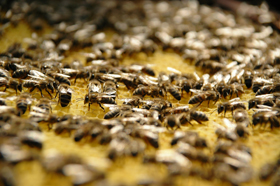07
Jan
Oregon Legislation To Restrict Home Use of Bee-Killing Pesticides
(Beyond Pesticides, January 7, 2014) An Oregon state representative, Rep. Jeff Reardon (D-Portland), plans to introduce legislation in February that will effectively ban for home and garden use certain neonicotinoid pesticides implicated in mass bee deaths this summer. This legislation is part of the growing national effort to ban or restrict the use of neonicotinoid pesticides. Last year, the Save America’s Pollinators Act was introduced by Representative Earl Blumenauer (D-OR) to ban the use of neonicotinoids nationally.
Rep. Reardon’s legislation would add neonicotinoid pesticides dinotefuran, imidacloprid, clothianidin and thiamethoxam to Oregon’s restricted pesticide use list. Under Oregon’s pesticide administrative rules,restricted use pesticides can only be applied by licensed pesticide applicators. Pesticide dealers are also required to keep records of product sales of these pesticides and maintain sales records for at least three years. The legislation would also require the state to implement special training and testing to ensure licensed pesticide applicators know how to minimize risk to pollinators. 
“These are dangerous chemicals. People who aren’t willing to take the time and effort to become fully educated should look for alternatives,” Rep. Reardon told The Oregonian.
Though this legislation would limit the amount of neonicotinoid pesticides directly applied to lawns and ornamental plants, it does not address the sub-chronic effects neonicotinoid pesticides have on pollinators when the chemicals are used as a seed coating. Neonicotinoids are systemic, meaning that as the plant grows the pesticide becomes incorporated into the plant. When honey bees and other pollinators forage and collect pollen or nectar, or drink from what are termed “guttation” (water) droplets emitted from neonicotinoid-incorporated crops, they are exposed to sublethal doses of the chemical. At this level the pesticides don’t kill bees outright. Instead, they impair bees’ ability to learn, to find their way back to the hive, to collect food, to produce new queens, and to mount an effective immune response.
A pilot study, co-released by Beyond Pesticides, found that 7 of 13 samples of garden plants purchased at top retailers in Washington DC, the San Francisco Bay Area and Minneapolis contain neonictinoids which that come from the use of treated seeds. This study is particularly alarming because homeowners who wanted to provide plant habit for pollinators may have unwittingly exposed them to harmful pesticides if they purchased plants at these garden stores.
This possible legislation comes after two massive bee deaths were recorded in two different Oregon towns in June. An estimated 50,000 bumblebees, likely representing over 300 colonies, were found dead or dying in Wilsonville which was the largest known incident of bumblebee deaths ever recorded in the U.S. After a preliminary investigation, the Oregon Department of Agriculture (ODA) confirmed that the massive bee die-off was caused by the use of the insecticide dinotefuran. Then, it was reported by The Oregonian that hundreds of bees were found dead after the same pesticide was used in the neighboring town of Hillsboro.
After these massive bee die offs, ODA placed temporary restrictions on the use of pesticides that contained dinotefuran. The rule even applied to licensed applicators and making an application of dinotefuran could have resulted in the revocation of an applicator’s license or the imposition of a civil penalty. However, this past November ODA removed these temporary restrictions and limited the ban on the use of dinotefuran and clothianidin specifically to linden trees, basswood, and other trees of the Tilia genus.
Beyond Pesticides through its BEE Protective campaign works with national and local groups to protect honey bees and other pollinators from pesticides and contaminated landscapes. As part of this campaign, Beyond Pesticides is working with consumers to demand that Lowes and Home Depot stop selling neonicotinoid pesticides and plants that are grown from neonicotinoid-treated seeds. You can sign our petition here. Beyond Pesticides is also a part ofa coalition-based national advertising campaign to raise awareness of pollinator declines and urge EPA to stop stalling by enacting substantive restrictions on the use of bee-harming pesticides. To support our efforts to restrict bee-toxic pesticides, visit save-bees.org and sign the petition to EPA Administrator Gina McCarthy.
Additionally, Beyond Pesticides’ 32nd National Pesticide Forum, Advancing Sustainable Communities —People, pollinators and practices, will take place in Portland, Oregon April 11-12, 2014. The annual conference will be held at Portland State University in conjunction with Northwest Center for Alternatives to Pesticides and Portland State University’s Institute for Sustainable Solutions. Issues in Oregon, the northwest, and nationally, including pollinator protection, pesticide use in forestry, and GE labeling and contamination, will be key topics at the upcoming Forum and we hope to see you there! For more information, see the National Pesticide Forum website.
Source: The Oregonian
All unattributed positions and opinions in this piece are those of Beyond Pesticides.










